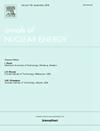Numerically efficient determination of kinetic parameters of the VR-1 nuclear reactor based on experimental data and ODE-constrained optimization
IF 1.9
3区 工程技术
Q1 NUCLEAR SCIENCE & TECHNOLOGY
引用次数: 0
Abstract
A method of adjusting nuclear reactor kinetic parameters to experimental data is proposed. The fractions of neutrons delayed via different precursor groups are of interest. Their values originally calculated by Monte Carlo simulations are modified to bring the power output of the reactor predicted by the point kinetics equations closer to the measured values. The measurements were performed on the VR-1 zero-power training reactor in the Czech Republic. Three reactivity patterns were investigated to account for the different reactor transients. The resulting ODE-constrained optimization problem is solved numerically, using the adjoint equations to obtain the gradient of the loss functional and applying a specifically tailored gradient descent technique. The performance of our approach is compared to other variants of gradient-based optimization. As a side result, a gradient descent step size adaptivity algorithm is proposed. Finally, discussion on the physical relevance of the obtained results is provided.
求助全文
约1分钟内获得全文
求助全文
来源期刊

Annals of Nuclear Energy
工程技术-核科学技术
CiteScore
4.30
自引率
21.10%
发文量
632
审稿时长
7.3 months
期刊介绍:
Annals of Nuclear Energy provides an international medium for the communication of original research, ideas and developments in all areas of the field of nuclear energy science and technology. Its scope embraces nuclear fuel reserves, fuel cycles and cost, materials, processing, system and component technology (fission only), design and optimization, direct conversion of nuclear energy sources, environmental control, reactor physics, heat transfer and fluid dynamics, structural analysis, fuel management, future developments, nuclear fuel and safety, nuclear aerosol, neutron physics, computer technology (both software and hardware), risk assessment, radioactive waste disposal and reactor thermal hydraulics. Papers submitted to Annals need to demonstrate a clear link to nuclear power generation/nuclear engineering. Papers which deal with pure nuclear physics, pure health physics, imaging, or attenuation and shielding properties of concretes and various geological materials are not within the scope of the journal. Also, papers that deal with policy or economics are not within the scope of the journal.
 求助内容:
求助内容: 应助结果提醒方式:
应助结果提醒方式:


